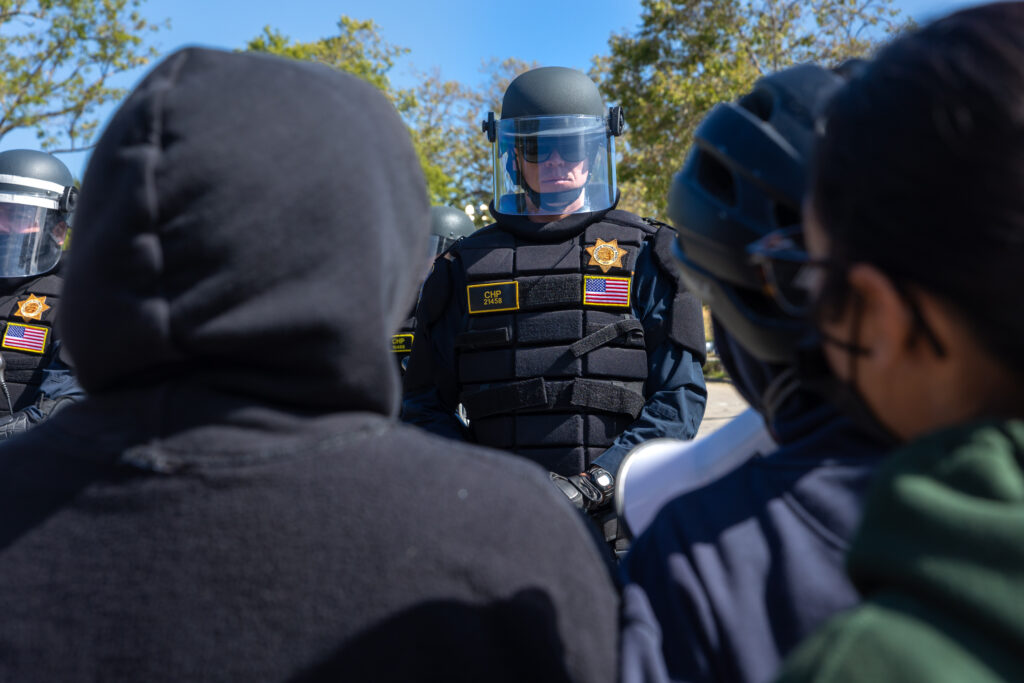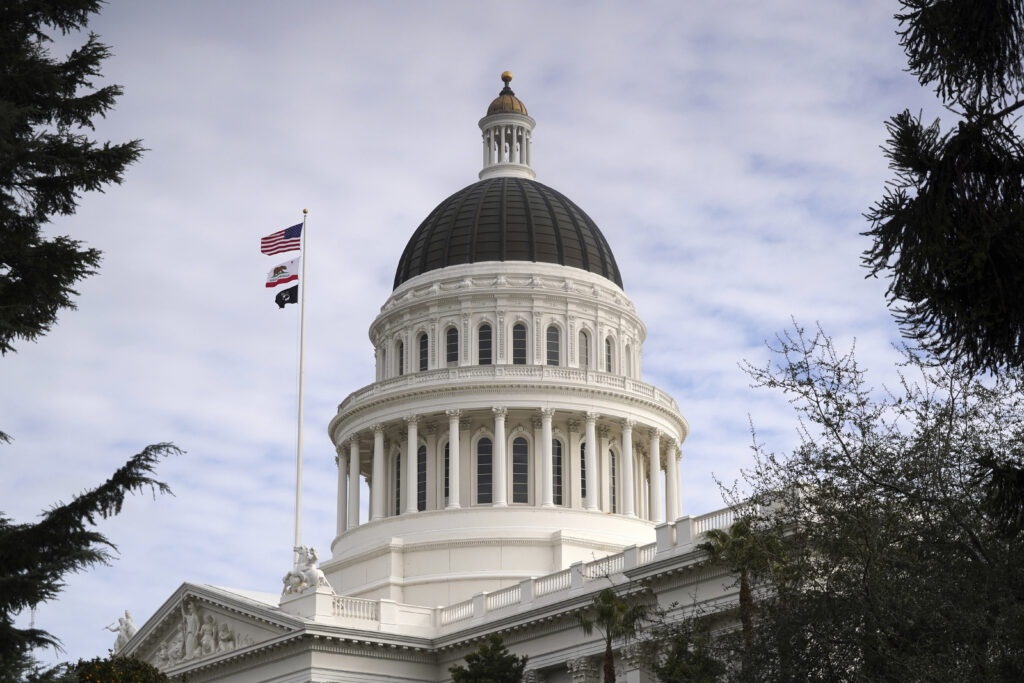
A general view of the California State Capitol building in Sacramento.
Credit: Kirby Lee / AP
California Democrats on an Assembly committee blocked two bills Tuesday that would have banned transgender athletes from girls’ sports, locker rooms, bathrooms and dorms, after an emotional three-hour hearing that underscored the political divide in both the country and state.
Assembly Bill 89 would have required the California Interscholastic Federation to change its policies and prohibit an athlete who was male at birth from participating in a girls’ interscholastic sports team. Assembly Bill 844 would have changed state law to require college and K-12 students who play sports to play on the teams and use the facilities that align with the sex they were assigned at birth.
Both bills failed in party-line votes to move out of the Committee on Arts, Entertainment, Sports and Tourism.
The hearing drew an overflow crowd of people with strong opinions on transgender rights, the political divide and President Donald Trump.
Assemblymember Kate Sanchez, R-Rancho Santa Margarita, author of Assembly Bill 89, said the bill was not politically motivated.
“Let’s be clear; it is not about hate,” Sanchez said. “It is not about fear, and it’s not right-wing talking points. This is entirely about fairness, safety and integrity in girls’ competitive high school athletics. That’s it.”
Committee member Rick Chavez Zbur, D-Hollywood, disagreed.
“It’s about playing on the hate and fear of transgender people, one of our most marginalized communities,” he said. “And it is right-wing talking points.”
Transgender rights are political
The rights of transgender people, who make up less than 1% of the U.S. population, have been rolled back under the Trump administration. Since Jan. 20, Donald Trump has signed executive orders restricting gender-affirming care and proclaiming there are only two biological sexes. He has announced plans to ban transgender troops from serving openly in the military, directed federal agencies to recognize only a person’s biological sex on passports and ordered that incarcerated transgender women be moved to men’s prisons.
“The Trump administration has not only targeted transgender people through hateful executive orders, but has tried to erase their existence — erasing websites that talk about them, erasing studies that inform us about the needs of the community, (and) attempting to ban them from medical care, from public life,” Zbur said. “And, you know, the thing I just want to say is this is really reminiscent, to me, of what happened in Nazi Germany in the 1930s.”
Since 2013, the California School Success and Opportunity Act has allowed students to participate in sports based on their gender identity. It’s not a popular stance in much of the nation. According to a Pew Research Center study released last month, two-thirds of the country prefer laws and policies that require athletes to compete on teams that match the sex assigned at birth.
Bill supporters quote Newsom
Republican lawmakers and other supporters of the bills were quick to bring up comments made by California Gov. Gavin Newsom during a recent podcast, during which the Democrat called the participation of transgender athletes in female sports “deeply unfair.”
“This bill is not just about compliance with federal law, it’s about doing the right thing for our girls,” said Assemblymember Bill Essayli, R-Corona, who authored Assembly Bill 844. “To quote Gov. Newsom — that right-wing extremist — this is an issue of fundamental fairness.”
Essayli has authored two other failed bills aimed at transgender students. Assembly Bill 1314, introduced in 2023, would have required schools to notify parents within three days if their child identifies as transgender. Assembly Bill 3146, introduced last year, would have banned health care providers from providing gender-affirming care in the form of procedures or prescriptions to people younger than 18.
California in the federal crosshairs
Last month, the U.S. Department of Education announced it was investigating the California Interscholastic Federation because it allegedly violated federal nondiscrimination laws by allowing transgender athletes to participate in women’s and girls’ sports.
Essayli called California’s law allowing transgender students to participate in sports and to use facilities based on their gender identity a violation of Title IX, a federal civil rights law that prohibits discrimination and harassment based on sex.
“If the Legislature does not take action to bring California into compliance with Title IX and federal directives, we will not only be failing our female students and athletes, but we are also jeopardizing a critical funding source for our school districts,” he said.
The Department of Education announced last month that it would revert to the Title IX regulations put in place during Trump’s first term in office, which base protections on biological sex, instead of on gender identity.
U.S. Secretary of Education Linda McMahon sent a letter to Newsom last week warning that the state could lose funding because of its policies, Essayli said. The federal government contributes about $8 billion annually to California schools.
The department has also announced it is investigating the California Department of Education because of a state law that bans schools from implementing parental notification policies requiring teachers to inform parents if their child asks to use a name or pronoun different from the one assigned at birth.
Democrats on the dais, including Assembly Speaker Robert Rivas, D-Salinas, who showed up at the hearing as a substitute for an absent committee member, railed against the Trump administration’s policies.
“Meanwhile, here in California, residents are facing cuts to Medicare, to schools, and to veterans’ services,” Rivas said. “Californians have lost their jobs because of DOGE (the Department of Government Efficiency). But our Republican colleagues, they don’t want to talk about that. Republicans keep emphasizing how this bill protects women and girls. And women do face threats today, but not from the very small number of transgender kids playing sports.”
Rivas said that in his more than six years in office, he has never been stopped at the grocery store by constituents concerned about transgender athletes playing sports on girls’ teams.
“There is no epidemic of transgender kids playing basketball and soccer or any other sport for that matter,” he said. “There are more kids right now with measles in Texas than there are transgender athletes playing in the NCAA. Look, this past December, NCAA President Charlie Baker testified at a congressional hearing that out of more than 500,000 total college student athletes, he believed that fewer than 10 of those athletes were transgender. That’s not an epidemic.”
Both sides cite harm to girls
Sanchez said Tuesday that the California policy has had “devastating consequences,” resulting in transgender athletes taking titles girls should have won and hurting girls physically during competition.
Both sides rolled out stories of girls who they say have been harmed. An athlete who lost a spot on a team to a transgender athlete. A girl in a conservative state who had to pull up her top in a bathroom to prove she was not transgender. A girl who was knocked unconscious by a ball spiked by a transgender athlete.
“I don’t feel there’s such a thing as girls’ sports anymore,” said a high school student identified only as Jaden, who says her chance to compete in the CIF State Track and Field Championships is at risk because of a transgender athlete with a No. 1 ranking.
“It feels wrong,” she said. “I don’t understand how my hard work, my dedication, my very best can be rendered meaningless by a policy that ignores the differences between males and females. If we keep on the way we’re going, it sends a horrible message to young women like me that our achievements can be erased, our opportunities diminished, and our voices silenced.”
Committee Chair Christopher Ward, D-San Diego, who also chairs the LGBTQ Caucus, called the bills harmful to all girls, many of whom could find themselves faced with intrusive methods to prove they were born female.
Female athletes would be better served with legislation that would provide equitable funding and facilities for girls’ sports, diminish the harassment of players, and combat the exploitation and abuse by coaches and support staff, instead of by legislation aimed at banning transgender athletes, he said.
“It sickens me that we’ve normalized that the cruelty is the point and that the collateral impact affects all girls,” Ward said.




